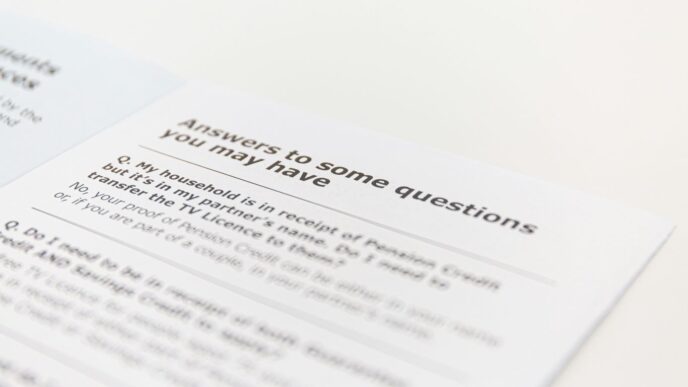Thinking about your next career step is a big deal. Sometimes, you just need to hear from people who are already doing what you want to do. That’s where informational interviews come in. They’re not job interviews, but more like chats to get the inside scoop. But to get the most out of them, you need to ask the right informational interview questions. This guide will help you figure out what to ask to really learn about a job or industry.
Key Takeaways
- Informational interviews are for gathering information and advice, not for getting a job directly.
- Asking thoughtful informational interview questions helps you understand daily tasks, challenges, and rewards.
- Learn about career paths and what inspires people in their roles to see if it fits you.
- Understanding industry trends and required skills prepares you for future opportunities.
- Always follow up with a thank-you note and ask for suggestions on who else to talk to.
Understanding The Purpose Of Informational Interviews

So, you’re thinking about a career change or maybe just trying to figure out what’s next. That’s where informational interviews come in. Think of them less like a job interview and more like a friendly chat with someone who’s already doing what you’re interested in. The main goal here isn’t to get a job offer on the spot, but to gather real-world information and advice.
What Is An Informational Interview?
Basically, an informational interview is a conversation you start. You reach out to someone in a field or company you’re curious about, and you ask them about their experience. It’s a way to get the inside scoop directly from the source. Unlike a formal interview where they’re evaluating you, here, you’re the one doing the evaluating – of the role, the company, and the industry. It’s a chance to learn without the pressure of being hired. You can find some great tips on how to approach these conversations on sites like Live Career’s site.
Gaining Insights Beyond Job Descriptions
Job descriptions can only tell you so much, right? They list duties and qualifications, but they don’t really capture the day-to-day vibe or the unspoken rules of a workplace. Informational interviews let you ask about the things you won’t find in a formal posting. You can ask about the company culture, how people communicate, or even what the office dress code is really like. This kind of detail is super important because, as research shows, a poor cultural fit can lead to job dissatisfaction. In fact, about 89% of hiring failures are linked to cultural mismatches.
Testing Assumptions About Roles
We all have ideas about what different jobs are like. Maybe you think a certain role is all about creative problem-solving, or perhaps you imagine another is strictly analytical. An informational interview is your chance to see if those assumptions hold up. You can ask questions that help you test your understanding of a position or a company. It’s a way to confirm if your mental picture matches the reality. This kind of reality check can save you a lot of time and potential disappointment down the road, helping you make more informed decisions about your career path.
Questions About Career Path And Motivation
What Inspired Your Career Journey?
It’s always interesting to hear what gets people excited about their work. Asking about their career path can give you a real sense of what drives people in this field. Did they stumble into it, or was it a lifelong dream? Understanding their motivations can tell you a lot about the industry’s appeal and what kind of challenges people are willing to take on. It helps you see if their journey sparks something in you, too.
Key Milestones In Your Professional Development
Everyone’s career has its turning points. You might ask about the big moments that shaped their professional lives. Were there specific projects, mentors, or even mistakes that really changed their direction? Learning about these milestones can offer a clearer picture of how people grow and adapt in this line of work. It’s like getting a roadmap of someone’s professional life, showing the highs and maybe some of the lows that taught them something important.
Advice For Aspiring Professionals
This is where you get the good stuff – the direct advice. What do they wish they knew when they were just starting out? What skills should you focus on developing early on? They might also share common mistakes to avoid or suggest resources that were helpful for them. This is your chance to get insider tips that aren’t in any textbook. It’s about learning from their experiences so you can make smarter choices for your own career move.
Exploring Daily Realities And Challenges

So, you’ve got a good idea of the career path and what motivates people in the field. That’s great! But what’s it really like day-to-day? This section is all about getting the nitty-gritty details, the stuff you won’t find in a glossy brochure. It’s about understanding the actual work and the bumps you might hit along the way.
A Typical Day In Your Role
This is where you get the inside scoop on the day-to-day grind. Forget the vague job descriptions; you want to know what someone actually does for eight hours (or more!). Ask about the rhythm of the day. Are there lots of meetings? Is it mostly heads-down work? What tools or software do they use constantly? Understanding this helps you picture yourself in the role. It’s the best way to see if the daily tasks align with your own work style and energy levels.
Most Rewarding Aspects Of Your Work
Everyone likes to feel good about what they do. What makes this person excited to get out of bed and go to work? Is it solving complex problems? Helping clients? Seeing a project come to life? Hearing about the rewarding parts can give you a real sense of the job satisfaction you might find. It also helps you identify what aspects of work are most important to you personally. Maybe they love the collaborative environment, or perhaps it’s the autonomy they have.
Significant Challenges You Encounter
No job is perfect, and knowing the tough parts is just as important as knowing the good stuff. What are the common hurdles? Is it tight deadlines, difficult stakeholders, or maybe keeping up with rapid changes? Understanding these challenges helps you prepare mentally and practically. You can also ask how they typically handle these situations. Learning how someone else navigated a tough spot can be incredibly helpful for your own future career planning.
Here’s a quick look at common challenges:
- Workload Management: Juggling multiple projects and deadlines.
- Stakeholder Communication: Managing expectations and feedback from various people.
- Adapting to Change: Keeping pace with new technologies or industry shifts.
- Problem-Solving: Tackling unexpected issues that arise.
Industry Trends And Future Outlook
Understanding where an industry is headed is pretty important, right? It’s not just about what’s happening now, but also what might be around the corner. Asking about trends can give you a real sense of the field’s stability and potential for growth.
How Has The Industry Evolved Recently?
Think about the last five years. What big shifts have happened? Maybe technology changed how things are done, or perhaps new regulations came into play. It’s helpful to ask people about the most significant changes they’ve personally witnessed. This gives you a ground-level view, not just the official company line. For example, has customer demand changed? Are new competitors popping up? Understanding these recent evolutions can help you see where the industry might be vulnerable or where it’s finding new footing. It’s also a good way to gauge how adaptable professionals in the field need to be. You might even ask about how they stay updated with these changes, as that can point you to useful resources.
Predictions For The Industry’s Future
So, where’s it all going? This is where you get to pick the brains of those who are really in the thick of it. What do they think will be the big developments in the next five to ten years? Are there new technologies on the horizon that will shake things up? Will certain roles become more or less important? It’s like getting a sneak peek into the future. You can also ask about potential challenges the industry might face, like economic shifts or changing consumer behaviors. This kind of forward-looking conversation can really help you plan your own career path and make sure you’re developing skills that will be relevant down the line. It’s all about being prepared for what’s next, and career development in 2025 is definitely going to be about staying ahead of the curve.
Impact Of Digital Transformation
Digital transformation is a buzzword for a reason. It’s changing almost everything. How has it specifically affected this industry? Are companies relying more on data analytics? Has automation changed workflows? Maybe customer interactions have moved online. It’s worth asking how these digital shifts are impacting daily work and what new skills are becoming necessary. For instance, you could ask:
- How has the adoption of new software changed your team’s productivity?
- What role does data play in decision-making within your company?
- Are there specific digital tools you find indispensable for your role?
Understanding this can help you identify areas where you might need to upskill or focus your learning. It’s about seeing how technology is reshaping not just the industry, but the actual jobs within it.
Essential Skills And Personal Attributes
So, you’ve got a good idea of what the job actually entails day-to-day, and maybe even how the industry is changing. That’s great! But what about the stuff that doesn’t show up on a resume? What personal qualities make someone tick in this field, and what skills do you really need to have in your toolkit?
Crucial Skills For Success In This Field
When you ask people about the skills they use most, you’ll often get a mix of technical know-how and softer abilities. It’s not just about knowing how to code or use a specific software; it’s also about how you communicate, solve problems, and work with others. For instance, someone in project management might list "stakeholder communication" as a top skill, alongside "risk assessment." It’s really about understanding what makes someone effective beyond just their qualifications. You might find that skills you already have are more transferable than you thought. For example, if you’re good at explaining complex ideas to friends, that’s a form of communication that’s valuable everywhere. It’s worth noting down the specific skills mentioned, especially if they’re areas you haven’t focused on yet. This can give you a clear direction for your own learning. Maybe you need to get better at data analysis, or perhaps public speaking is something you want to work on. Thinking about how to develop these can be a good next step. Learning new skills can be made easier with resources like video training, which offers a flexible way to learn at your own pace. Check out video training options.
Personality Traits That Thrive Here
Beyond the hard skills, personality plays a big part. Some roles might need someone who’s really detail-oriented and likes working independently, while others thrive on collaboration and brainstorming in groups. Think about the kind of work environment you prefer. Are you someone who likes structure and predictability, or do you do your best work when things are a bit more fluid and unpredictable? It’s helpful to ask directly: "What kind of personality do you think does best in this role?" Their answer can tell you a lot about whether you’d fit in. If the job involves a lot of client interaction, being naturally outgoing and a good listener would probably be a big plus. On the other hand, a research-focused role might suit someone more introverted and analytical. Be honest with yourself about your own tendencies. If a role requires a super-fast-paced, high-pressure approach and you prefer a more measured pace, it might not be the best match for your happiness.
Skills You Wish You Had Earlier
This is a fantastic question to ask because it taps into the wisdom of experience. People often reflect on skills they wish they’d developed sooner in their careers. It could be anything from mastering a particular software to improving their negotiation abilities or even learning how to manage their time more effectively. For example, someone might say, "I wish I’d learned advanced Excel functions much earlier; it would have saved me so much time." Or perhaps, "I wish I’d taken more public speaking courses right out of college." These insights are gold because they highlight practical skills that can make a real difference in your day-to-day work and career progression. It’s like getting a cheat sheet for what’s truly important. You can use this information to prioritize your own skill development, focusing on areas that are frequently mentioned as beneficial by those already in the field. It’s a great way to get ahead and avoid some common learning curves.
Navigating Your Next Steps
So, you’ve had some great chats, learned a ton, and maybe even got a clearer picture of what you want. Now what? It’s time to figure out how to actually make that next career move happen. Think of these informational interviews as laying the groundwork, and now you’re ready to start building.
Recommended Resources and Professional Groups
People you talk to often have the inside scoop on where to find more information or connect with others in the field. Don’t be shy about asking them directly. They might point you towards industry-specific websites, newsletters that are actually worth reading, or even professional organizations that are active and helpful. For instance, someone might mention a particular online forum or a local chapter of a professional association. Getting these recommendations can save you a lot of time searching for relevant resources. It’s like getting a shortcut to the good stuff. You can also ask about books or articles that really shaped their thinking about the industry. It’s always good to have a list of things to check out after the conversation.
Advice For Securing A Similar Role
Once you’ve got a feel for the day-to-day and the skills needed, you’ll want to ask how someone actually landed a job like theirs. What did they do that worked? Were there specific projects or experiences that made a difference on their resume? You might ask something like, "Looking back, what actions or activities were most important for you when you first started in this role?" Understanding the practical steps others took can give you a roadmap. It’s not just about having the right skills on paper; it’s about how you present them and what experiences you highlight. Think about what kind of person excels in this line of work, too. That can help you tailor your own approach.
Who Else Should I Speak With?
This is a classic question, and for good reason. The person you’re speaking with likely knows others who could offer different perspectives or insights. They might suggest talking to someone in a different department, at a different company, or even someone who has a slightly different role. It’s a way to broaden your network and gather even more information. You could say something like, "Is there anyone else you think would be beneficial for me to speak with as I explore this field?" This can open doors you didn’t even know existed and help you build a more complete picture of the industry. It’s a smart way to keep the momentum going and build your professional network.
Wrapping It Up
So, you’ve got the questions, you know how to ask them, and you’re ready to go. Remember, these conversations aren’t about getting a job right then and there. They’re about learning, connecting, and figuring out if a path is right for you. Think of each chat as a little piece of a bigger puzzle. By asking smart questions and really listening, you’re building a clearer picture of your next career step. Don’t forget to send a thank-you note afterward – it’s a small thing that makes a big difference. Now go out there and start exploring!
Frequently Asked Questions
What’s the main point of an informational interview?
The main idea is to learn about a job or field from someone who already works in it. It’s not like a regular job interview where you’re trying to get hired. Instead, you’re asking questions to gather information and get advice, like learning about their day-to-day tasks or how they got started.
Why should I ask about someone’s career journey?
Learning about how someone ended up in their current job can be super helpful. It might show you different paths you could take, what kind of training or experience helped them, and what inspired them to choose this career in the first place. It gives you a real-life story behind the job title.
What’s the best way to understand what the job is actually like?
Ask them to describe a typical day! This helps you imagine yourself doing the work and see what the daily tasks and challenges really are. You can also ask what they enjoy most and what the hardest parts of their job are to get a full picture.
How can I find out about the future of a job or industry?
You can ask how the industry has changed recently and where they think it’s going in the next few years. This helps you understand if the field is growing or shrinking and what new things might be important, like new technology.
What skills should I focus on developing?
It’s smart to ask what skills are most important for doing well in that job or field. This can guide you on what to learn or practice. Also, ask about personality traits that work well in that environment; it helps you see if you’d be a good fit.
What should I do after the interview?
Always thank the person for their time, maybe with a quick email. It’s also a great idea to ask if they know anyone else you should talk to, as this can help you build your network. Think about their advice and what you learned to plan your next steps.














